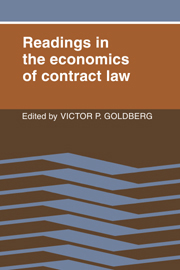Book contents
- Frontmatter
- Contents
- Preface
- Readings in the economics of contract law
- Part I Some preliminaries
- Part II Contract law and the least cost avoider
- Part III The expectation interest, the reliance interest, and consequential damages
- Part IV The lost-volume seller puzzle
- Part V Specific performance and the cost of completion
- Part VI Power, governance, and the penalty clause puzzle
- Part VII Standard forms and warranties
- Part VIII Duress, preexisting duty, and good faith modification
- 8.1 Duress by economic pressure, I
- 8.2 Gratuitous promises in economics and law
- 8.3 The mitigation principle: toward a general theory of contractual obligation (2)
- 8.4 The law of contract modifications: the uncertain quest for a benchmark of enforceability
- Questions and notes on duress
- Part IX Impossibility, related doctrines, and price adjustment
- Questions and notes on impossibility and price adjustment
- References
- Index of cases
- Author index
- Subject index
8.2 - Gratuitous promises in economics and law
Published online by Cambridge University Press: 10 November 2010
- Frontmatter
- Contents
- Preface
- Readings in the economics of contract law
- Part I Some preliminaries
- Part II Contract law and the least cost avoider
- Part III The expectation interest, the reliance interest, and consequential damages
- Part IV The lost-volume seller puzzle
- Part V Specific performance and the cost of completion
- Part VI Power, governance, and the penalty clause puzzle
- Part VII Standard forms and warranties
- Part VIII Duress, preexisting duty, and good faith modification
- 8.1 Duress by economic pressure, I
- 8.2 Gratuitous promises in economics and law
- 8.3 The mitigation principle: toward a general theory of contractual obligation (2)
- 8.4 The law of contract modifications: the uncertain quest for a benchmark of enforceability
- Questions and notes on duress
- Part IX Impossibility, related doctrines, and price adjustment
- Questions and notes on impossibility and price adjustment
- References
- Index of cases
- Author index
- Subject index
Summary
Often it is possible for a party to make a binding promise, unsupported by any fresh consideration, to modify a term of an existing contract. For example, the payor in a construction contract might agree to pay a higher price to a builder who had encountered unexpected soil conditions. The motives for such promises are various: to gain a reputation for “fair dealing” (really risk sharing), to avoid driving the promisee into bankruptcy (which might prevent his completing performance or raise the cost of his doing so), or even to be altruistic (the contingency giving rise to modification may have dramatically altered the relative wealth position of the parties). In any event, the stakes are often substantial in such cases, while the increment in utility to the promisor may also be substantial because of the length of time over which optimal performance may extend.
Consider the example of the house purchaser who promises the builder a higher than contract price because the builder has encountered some unexpected difficulty which may make it impossible to complete the contract at the agreed price. If the purchaser merely declares his intention of paying the builder a higher price, but is free to renege, the builder may decide not to complete performance but instead to take his chances in bankruptcy court. Yet the promisor dare not pay him the extra price in advance in exchange for the builder's promise to continue, for if the contractor is financially shaky for other reasons, the prepayment may end up in the hands of a trustee in bankruptcy, with the purchaser relegated to the status of an unsecured creditor.
- Type
- Chapter
- Information
- Readings in the Economics of Contract Law , pp. 194 - 198Publisher: Cambridge University PressPrint publication year: 1982
- 1
- Cited by



